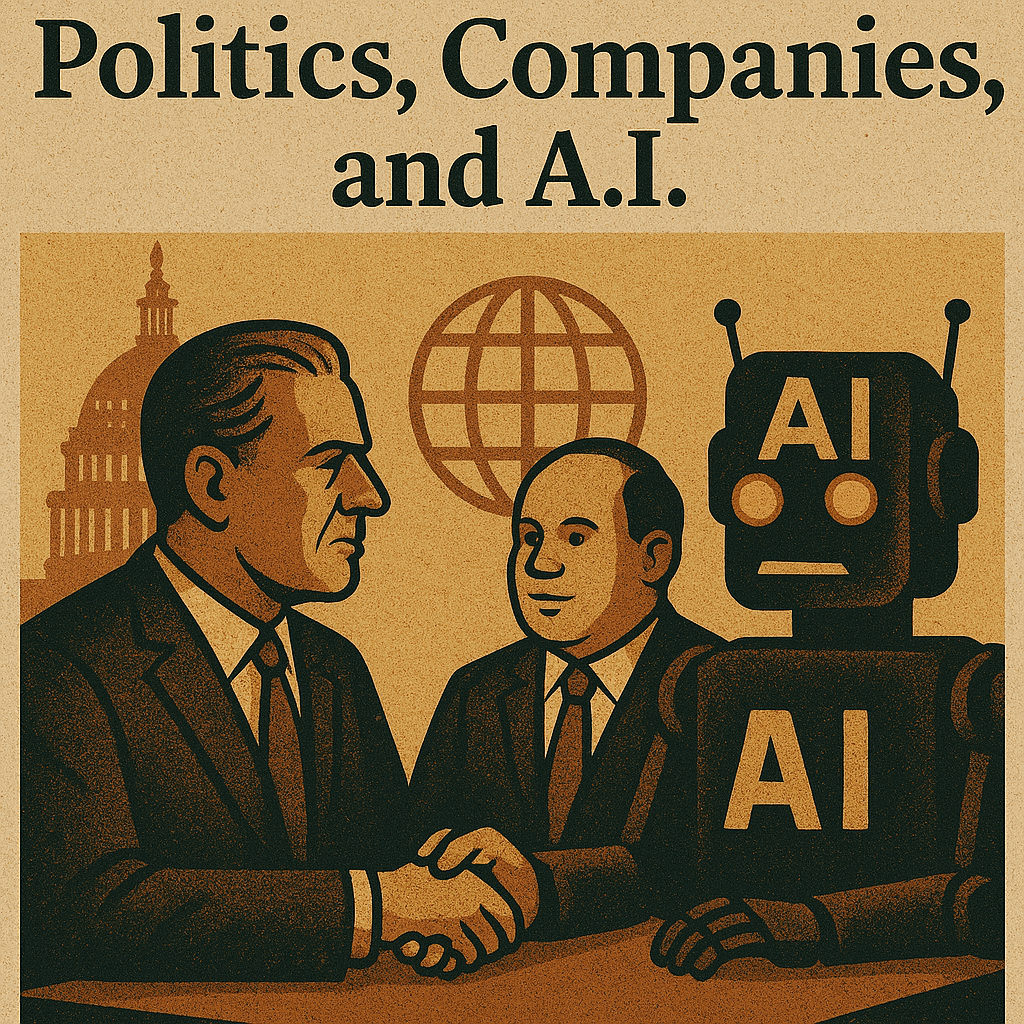A.I. A Political Force, Not Just a Technological One

A Political Force, Not Just a Technological One
A.I. has rapidly evolved from a laboratory curiosity into a force shaping public life—from healthcare and policing to finance and warfare. But while it’s often treated as a neutral tool, A.I. is anything but. As it embeds itself into society, it becomes a new form of power—wielded largely by two entities: governments and corporations.
In recent years, political leaders across the globe have recognized A.I. as a strategic asset. National investments in A.I. by the U.S., China, and the European Union reflect its perceived potential—not just for economic transformation but for military and surveillance dominance. These priorities have turned A.I. from a science project into a geopolitical arms race.
Corporate Control and the Myth of Benevolence
At the same time, A.I. development has been monopolized by a handful of Big Tech giants—Google, Microsoft, Meta, Amazon, and OpenAI. These companies control the datasets, computing infrastructure, and capital needed to build state-of-the-art systems.
While the marketing often speaks of "democratizing intelligence" or "building safely," the reality is starkly different. A.I. is a business, and the business model thrives on extraction: of user data, of attention, of labor. The race to commercialize A.I.—from chatbots to surveillance tools—favors profitability over privacy, scale over safety, and disruption over democratic dialogue.
These corporations also exert tremendous influence over regulation. In the U.S. alone, tech companies spend hundreds of millions on lobbying to shape favorable legislation—or block it entirely. In many cases, they are writing the rules they claim to follow.
Tech and Politics: An Uneasy Alliance
We often assume that politics and Big Tech are at odds. But when it comes to A.I., they are frequently in lockstep. Governments rely on tech firms to modernize services, crunch data, and build infrastructure—while tech companies look to governments for subsidies, contracts, and regulatory leniency.
From Amazon’s cloud contracts with intelligence agencies to Palantir’s work with law enforcement, the private-public tech partnership is reshaping how power is exercised in the digital age. Politicians benefit from the efficiencies A.I. promises, and corporations benefit from the access and impunity it affords them.
Behind the scenes, closed-door meetings, elite summits, and advisory councils shape the future of A.I.—with little public transparency or participation. When decisions that affect billions are made by a handful of CEOs and policymakers, democracy takes a back seat.
A Tool for Manipulation and Control
Beyond economics and infrastructure, A.I. has already proven to be an effective tool for political manipulation. Social media algorithms shaped by A.I. influence what news people see—and don’t see. Deepfakes, bots, and microtargeted propaganda have all been used to manipulate voters and suppress dissent.
Authoritarian regimes, in particular, have embraced A.I. for mass surveillance and population control. China’s social credit system, powered by facial recognition and behavioral data, offers a glimpse into the future of algorithmic authoritarianism. But even in democratic nations, the lines are blurring: police departments use predictive analytics, governments deploy biometric ID systems, and surveillance capitalism goes unchecked.
A.I. doesn’t have to be repressive by design—it just needs to be exploited by the wrong hands. And increasingly, those hands are wearing suits and ties.
Who Pays the Price?
While tech CEOs and politicians celebrate A.I. innovation, the real cost is often paid by ordinary people. Workers are displaced by automation. Biases in training data lead to discriminatory policing and hiring. Privacy is compromised in the name of “efficiency.”
In global terms, the power imbalance is even starker. Wealthy nations and corporations dominate A.I. development, while lower-income countries are left as consumers, testing grounds, or data sources. This digital divide threatens to entrench global inequalities and export oppressive technologies worldwide.
A.I. isn’t lifting all boats—it’s fueling a new kind of elite class warfare, with algorithms as its weapon of choice.
Reclaiming the Future
We are not powerless in this process—but time is running out. To ensure that A.I. serves the many rather than the few, several urgent steps must be taken:
-
Enforce global A.I. governance that includes human rights watchdogs, labor unions, and the public—not just states and CEOs.
-
Break corporate monopolies in A.I. infrastructure, and support public research and open alternatives.
-
Pass binding regulations that guarantee data rights, transparency, and redress for harm.
-
Educate the public to resist techno-solutionism and hold both companies and politicians accountable.
A Crossroads of Power
Artificial intelligence could become humanity’s greatest tool—or its most dangerous weapon. But right now, the people shaping that future are not accountable to the public. They're accountable to investors, political allies, and short-term interests.
If we do nothing, the trajectory is clear: a world of increasing surveillance, economic inequality, and algorithmic control—designed by the powerful, for the powerful.
But if we demand transparency, fairness, and democratic control, we still have the power to redirect that path. A.I. does not have to be a force of oppression. It can be a force of liberation—if we wrest it from the hands of those who would use it otherwise.

- Art
- Causes
- Crafts
- Dance
- Drinks
- Film
- Fitness
- Food
- Games
- Gardening
- Health
- Home
- Literature
- Music
- Networking
- Other
- Party
- Religion
- Shopping
- Sports
- Theater
- Wellness


